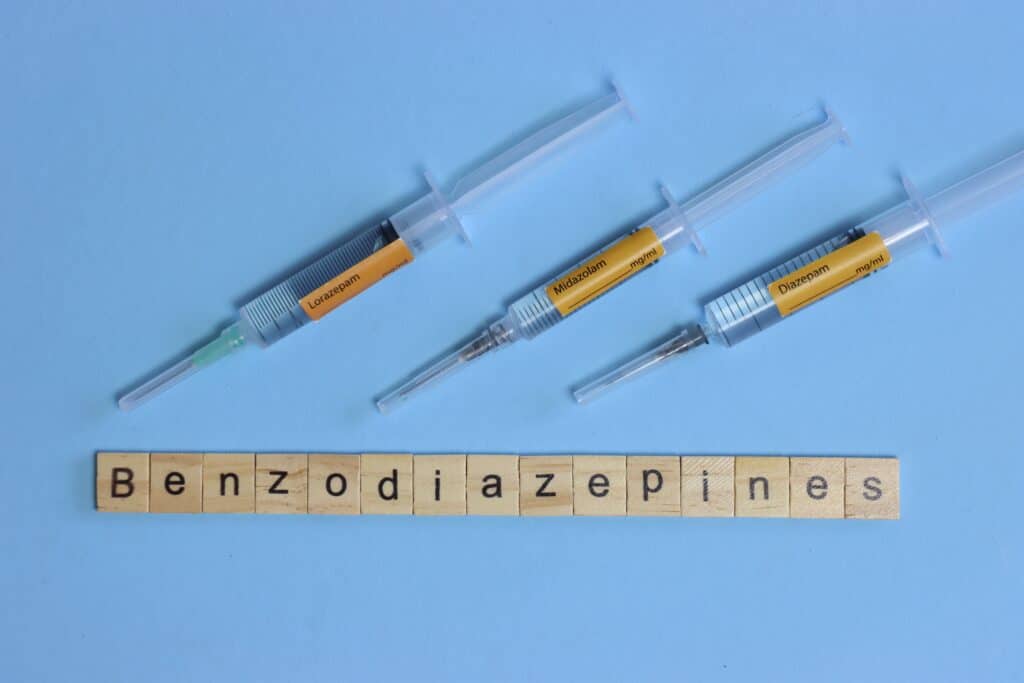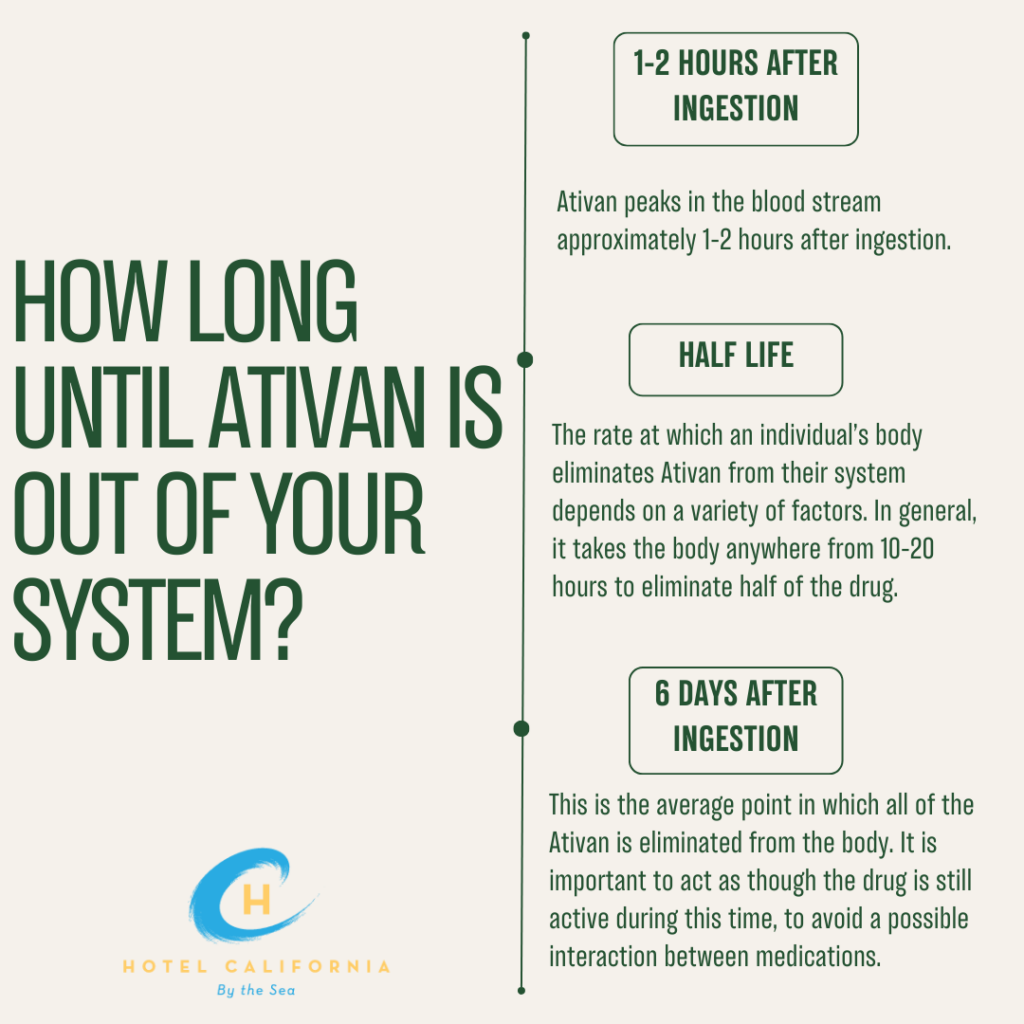What is the half-life of Ativan?
Mental health conditions such as anxiety have become more and more common in today’s society. Anxiety can be a crippling condition that interferes with a person’s day-to-day activities making them unable to properly function. One of the most common is generalized anxiety disorder. This is a condition in which a person can experience worry and anxiety for at least six months or more. Research and studies believe anxiety can be caused by a chemical imbalance in the brain. Medications such as Ativan have become popular in helping to treat symptoms of anxiety.

Ativan, known by its generic name lorazepam, is a sedative-hypnotic benzodiazepine medication. Ativan is a schedule IV Controlled Substance with a high risk for habit-forming addictions. It is a central nervous system depressant and is used to treat generalized anxiety disorder, insomnia caused by anxiety and seizures. Though not FDA-approved for treating conditions such as depression, pain relief, and alcohol withdrawal, some physicians prescribe Ativan for these off-label uses. The powerful sedative slows down brain function and activity. It is usually recommended for short-term use of four months or less due to its high risk for dependency and addiction.
How does Ativan work?
Ativan works by increasing GABA chemicals in the central nervous system. This produces a calming effect that helps to relieve symptoms of anxiety and can induce sleep for people suffering from sleep conditions. In the body, neurons constantly send signals and messages to each other. When the body is in an anxious state, the neurons begin sending messages at an elevated and abnormal level. Ativan works to control this action to slow down the messaging system, which can help, induce a sense of calm and anxiety relief. The benzo is administered in two different forms, an oral tablet and a liquid solution usually administered by intramuscular injection.
Common side effects for Ativan misuse:
- Drowsiness
- Dizziness and headache
- Weakness and fatigue
- Confusion and memory issues
- Lack of coordination
- Restlessness
- Worsening depression and anxiety
- Respiratory depression
- Cardiovascular depression
- Low blood pressure
- Convulsions and seizure – when uncontrolled bodily movements occur along with loss of consciousness and awareness
- Aggression, hostility, agitation and anger
- Dependence, misuse and addiction
- Overdose, coma and death

What is Ativan’s half-life?
How long does Ativan stay in the body? What is the half-life of Ativan? There are many different factors that can affect how long the drug stays in the system as well as how long the effects will last. The average half-life of Ativan taken by oral tablet is about 12 hours. The average half-life of Ativan taken by intramuscular injection is about 14 hours give or take. It takes about 4-5 half-lives for the body to process and eliminate the majority of the drug.
Ativan tablets can stay within the system for about 60 hours. Ativan injections can remain in the system for about 70 hours. According to the Mayo Clinic, the average elimination time for Ativan is about five days. However, some tests can show detectable traces of the drug up to nine days after the initial dose. This is also dependent on which route of ingestion was taken.
Ativan, like other benzo medications, is metabolized in the liver. Liver health is an important factor in how the body processes the medication and how long it can last within the body before it is eliminated. Unhealthy liver functions can slow down the elimination process. Excessive amounts of Ativan due to drug misuse can also interfere with the elimination process. Both conditions can cause a toxic build-up of the drug and make it more difficult for the body to effectively remove the drug from the system.
Other factors that can affect how Ativan is metabolized
- Age
- Kidney function
- Individual height and weight
- Dosage and frequency of dosage
- Use of other substances
- Genetics
- Hydration
- History of drug use
- Administration of the drug
Check Your Insurance Coverage for FREE
Find out if your insurance covers addiction treatment in minutes. We accept most insurance!
How long do the effects of Ativan last?
On average, the effects of Ativan begin within 2-3 hours and can last between 6-8 hours. With an intramuscular injection, the onset of effects can begin within about three hours. When the drug is administered sublingually, peak effects can begin at about an hour. And when the drug is administered intravenously, effects can be felt within one to three minutes.
In drug testing, Ativan can be detected in urine for up to six days after the initial dose. Ativan can be detected in blood for up to three days after the initial dose. And, Ativan can be detected in saliva for up to eight hours after the initial dose.
Ativan vs Xanax
Ativan
- Lorazepam
- Eight hours duration of effects
- Provides longer-lasting effects
- The peak concentration of effects begins at the two-hour mark
- Preferred medication for older adults suffering from symptoms of anxiety
- Medication is available in different dosages, formulations and methods of administration
- One dose of Ativan can take anywhere from 60-90 hours to be fully eliminated from the body
Xanax
- Alprazolam
- Quicker onset of effects that can last between 4-6 hours
- Sedative and performance impairment occurs more quickly and dissipates more quickly compared to Ativan
- The peak concentration of effects begins at the one-hour mark
- Also approved to treat panic disorders
- One dose of Xanax can take anywhere from 48 hours to be fully eliminated from the body
Reach out to Hotel California by the Sea
We specialize in treating addiction and other co-occurring disorders, such as PTSD. Our Admissions specialists are available to walk you through the best options for treating your addiction.
Treatment for Benzos Addiction
Anxiety is a common mental health condition that is often treated through medication such as Ativan or other benzodiazepines. When used as recommended, Ativan can be very effective in helping those who suffer from generalized anxiety disorder, and sleep disorder caused by anxiety and stress. However, like other benzos drugs, Ativan is highly potent and there is a risk of dependency when taking the drug. Hotel California by the Sea provides substance use disorder treatment for clients at all levels of care, especially those who have a dual diagnosis.
We offer detox, residential and outpatient programming. Clients will receive individualized treatment plans that may consist of medication treatments, individual counseling and group therapy. Some of the evidence-based treatments we offer include CBT, DBT, and EMDR therapy. These individual and group therapies are especially beneficial when treating clients with co-occurring mental health conditions. Hotel California by the Sea provides the resources, tools and support, clients need in order to overcome their addiction.
References:
https://www.medicalnewstoday.com/articles/326015#_noHeaderPrefixedContent
https://www.rehabcenter.net/ativan/detection-times/
https://www.nami.org/About-Mental-Illness/Treatments/Mental-Health-Medications/Types-of-Medication/Lorazepam-(Ativan)
https://psychcentral.com/drugs/ativan
https://www.verywellmind.com/how-long-does-ativan-stay-in-your-system-80222
https://www.ncbi.nlm.nih.gov/books/NBK532890
https://addictionresource.com/drugs/ativan/how-long-stays-in-system/
https://zinniahealth.com/substance-use/ativan/duration
https://www.drugs.com/medical-answers/ativan-vs-xanax-3029943/#:~:text=Xanax%20has%20a%20quicker%20onset,compared%20with%20Ativan’s%208%20hours
https://www.goodrx.com/conditions/generalized-anxiety-disorder/xanax-or-ativan-which-is-better-for-anxiety
